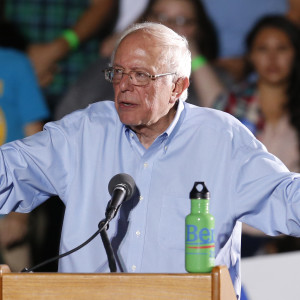Just hours before the first Democratic Presidential primary debate is set to take place in Las Vegas, Nevada, with Harvard professor Lawrence Lessig sidelined because of anemic polling results, those very polls are coming under increasing scrutiny from the pollsters themselves.
Last week, Politico blasted the headline: “Pollsters: Don’t trust us to winnow GOP field,” citing Rutgers University professor Cliff Zurkin saying, “Polls are being used to do a job that they’re really not intended for,” and that “polling has become increasingly unreliable because Americans are harder to reach.”
And days later Dr. Frank Newport, editor-in-chief of Gallup, rocked the political world by announcing that his organization would not poll the primary elections this year. Beyond that he would not affirm that Gallup would poll the general elections – leaving open the possibility that the most recognized and respected name in polling may be out of the political horserace business altogether. The reason, of course, is that polling is simply not as accurate as it used to be, with the proliferation of hard-to-track mobile phones and with fewer than one-tenth of those surveyed agreeing to voice their opinions.
Many are taking these developments to mean what many Republican presidential candidates – and Prof. Lessig – believe already: the polling numbers that are being reported may not be reliable.
The implications, however, of Dr. Newport’s bombshell go far beyond the upcoming primary debates and may very well impact the general election debates slated to begin in September 2016. In fact, according to some, our political system’s overreliance on public polling numbers may be costing a promising candidate the opportunity to present his or her views to an interested public; and could ultimately mean our nation is not getting its best and brightest to run for president.
The little known, but incredibly powerful Commission on Presidential Debates has since 2000 required candidates to achieve an average of 15 percent support in five national polls in order to participate in the sanctioned general election debates. This requirement has been supported by the two major national parties, with the singular purpose – according to several groups such as Level the Playing Field, Change the Rule, and the Green and Libertarian parties – as a way to keep out third party or Independent candidates.
These groups filed suit earlier this year with the Federal Election Commission against this barrier to entry. In its response to the suit, the CPD pointed to Dr. Newport’s expertise noting that “CPD has accepted and relied upon Dr. Newport’s recommendation on poll selection.”
In sworn testimony, Dr. Newport said, “Public polling is by far the best method of measuring a candidate’s support among the electorate prior to Election Day. Polling involves a scientific process through which polling experts seek to determine, mathematically, the best estimate of the public sentiment on a particular topic at a specific point in time.”
Of course on the eve of the 2012 presidential election, Dr. Newport famously predicted that Mitt Romney would win the White House. Not only was he wrong; he wasn’t even close as President Obama ended up winning by nearly 4 percentage points nationwide.
Faced with the fallibility of his own polling and the overdependence networks have displayed in setting the debate structure, Dr. Newport seems to be backtracking. As reported in Politico when he announced Gallup’s decision to not poll political matchups, he said, “We believe to put our time and money and brainpower into understanding the issues and priorities is where we can most have an impact.”
This certainly puts the CPD in a quandary. If entry into the debates relies almost entirely on polling numbers but the polling experts are losing faith in their own polls’ ability to accurately track support for candidates, can the CPD continue to rely on these polls as criteria for entry?
Former chairman of the Republican National Committee and current co-chair of the CPD Frank Fahrenkopf had set a deadline for announcing the entry criteria for the 2016 general election presidential debates for one year prior to the first debate on September 26, 2016.
That deadline has come and gone, so now what?
“The CPD has resisted suggestions proposed by [Level the Playing Field] by showcasing Newport’s claims about the viability of polling,” said. Cara McCormick, CEO of Level the Playing Field. “Those claims have been completely undermined by Gallup’s announcement.”
If not polls, then what?
Several members of the reform group Change the Rule — including former legislators like Sen. Bob Kerrey, Reps. Lee Hamilton and Vin Weber, and Gov. Tom Kean, plus former CIA Director Mike Hayden and Stanford political scientist Larry Diamond — have proposed a national online primary to pick a single independent winner at least six months before the election. This would give the victor, who would be guaranteed a spot on the debate stage, enough time to develop media notice and funding to compete with the Democratic and Republican nominees.
Another proposal focuses on gathering signatures across the country; following the long held state requirement of using petitions, not polls, to determine ballot access.
No matter what factors the CPD ultimately decides to use to determine debate eligibility, one thing is clear: using traditional polling data is becoming less and less trustworthy to determine voters’ actual preferences.
“Americans want the chance to vote for an independent for president,” said Jim Glassman, adviser to Level the Playing Field. “No longer should the members of the Commission on Presidential Debates use polling as a means of preventing that chance.”

